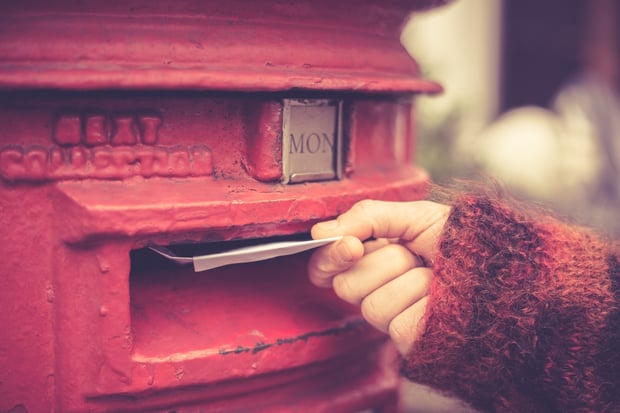 Image via Shutterstock
Image via Shutterstock
The traditional "poor man’s copyright" is a practice where you take a work you've created, put it in an envelope, and mail it to yourself via the United States Postal Service. Because the Postal Service would stamp the envelope with a postmark that had the date of mailing, it's argued that the date on the envelope proves that the work was created on or before that date. Otherwise, if you hadn’t created it yet, how would you have mailed it to yourself?
Now, with the internet, the argument people try to present to me is that once a person posts something on the internet, the timestamp of the posting is enough to show that the work was created on or before the date that it was posted online.
So, is any version of the poor man’s copyright enough to protect your songs? The short answer is no.
What's the definition of a copyrighted work?
A work that meets the standards of originality is considered to be copyrighted under United States law when that work is "fixed in any tangible medium of expression," (17 U.S. Code §102) which means that the work is put into a physical medium that can be reproduced, like writing it down, recording it on an audio or video recorder, etc.
Why the poor man’s copyright isn’t enough
There are a few reasons why the date or timestamp isn't enough to protect a work.
Firstly, while as a matter of logic the work had to have been created on or before it was mailed or posted, it doesn’t dictate when the work was actually created. For example, if Person A creates a work in January of a certain year, but doesn't mail or post it until September of that year, the date/timestamp Person A seeks to use as evidence will be in September. If Person B somehow has access to Person A’s work, copies a portion of that work, and releases and/or registers his new work for copyright in July, then Person B’s work will have a date of July and Person A’s work will have a date of September, without concrete proof that his or her work was actually written in January, before Person B’s work.
While it's true that Person A could show that Person B had access to his or her work, a date on a federal copyright registration certificate will almost always trump the date/timestamp and other date evidence.
In addition, if Person A had registered for federal copyright protection, he or she could have indicated that the work was created in January even if he or she filed later. Furthermore, Person A couldn't even sue for infringement in federal court without having a federal copyright registration, leaving him or her without strong options to defend his or her work if it was infringed.
Why register your work?
Federal copyright registration with the United States Copyright Office is always advisable because:
- A person cannot sue in federal court for copyright infringement without a federal registration.
- The date of creation listed on a federal registration certificate is the strongest evidence a court will consider.
- Federal registration provides additional benefits including but not limited to:
- Public notice of who owns the work
- Listing in the United States Copyright Office’s online databases
- A legal presumption of ownership of the work in court (if certain conditions are met)
- Statutory damages and attorney’s fees (i.e. more money!) can be awarded to the winner of an infringement suit (if certain conditions are met)
You can register your own works for copyright protection; the online registration fee ranges from about $35 to $55. However, the terms and application can get complicated, especially for someone who has never filed a registration application before. You don’t want to later find out that your copyright is invalid, like Rick Ross just did. I recommend a music attorney or service like Indie Artist Resource to file the registration so it's done correctly the first time.
Registering works for federal copyright protection won’t prevent someone from infringing, but it does provide the strongest ammunition to protect creative works.
Do you have questions that you’d like to get answered in an upcoming "Ask a Music Lawyer" article? Please send topic requests to askamusiclawyer@gmail.com. Please note that specific case advice cannot be given, and if you have questions pertaining to an issue you are personally experiencing, you should seek a consultation with a music attorney.
Disclaimer: This article is for educational and informational purposes only and not for the purpose of providing legal advice. The content contained in this article is not legal advice or a legal opinion on any specific matter or matters. This article does not constitute or create an attorney-client relationship between Erin M. Jacobson, Esq. and you or any other user. The law may vary based on the facts or particular circumstances or the law in your state. You should not rely on, act, or fail to act, upon this information without seeking the professional counsel of an attorney licensed in your state.
If this article is considered an advertisement, it is general in nature and not directed towards any particular person or entity.
Next up: Copyright Essentials: What Every Musician Should Know
Erin M. Jacobson is a practicing music attorney, experienced deal negotiator, and seasoned advisor of intellectual property rights. She protects clients ranging from Grammy and Emmy Award winners to independent artists, record labels, music publishers, and production companies. Ms. Jacobson also owns and oversees all operations for Indie Artist Resource, the independent musician’s resource for legal and business protection offering template contracts, consultations, and other services designed to meet the unique needs of independent musicians.


